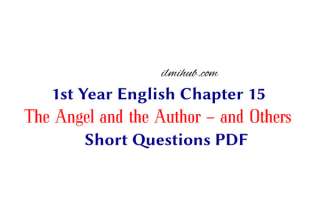In this post, I am sharing 1st Year English Poem 4 O Where are You Going Explantion of Stanzas with Reference to the Context. This is the 4th Poem in 11th Class English Book 3. O Where are You going Poem Explantion of All Stanzas with Reference to the context is being shared for the students of Class 11. I am gradually uploading education notes for Intermediate Part 1 & II. With the point of view of English Notes I have already shared 1st Year English Book 1 Notes and now I am updating 11th Class English Book 3 Notes.
However, students of Class 11 can download PDF Books of all subjects as well as Notes of all subjects in PDF farmat.
1st Year English Poem 4 O Where Are You Going Explanation of Stanzas with Reference to the Context
Stanza 1
“O where are you going?” said reader to rider,
“That valley is fatal when furnaces burn,
Yonder’s the midden whose odours will madden,
That gap is the grave where the tall return.
Reference
These lines have been taken from the poem, “O Where are You Going?” by W.H. Auden.
Context
Two opposite forces are at work in the mind of a person heading towards his goal. Negative forces are fear and uncertainty while the positive are courage and determination. The poet says that the brave cannot be discouraged by destructive forces.
Explanation
The reader, who has theoretical knowledge, questions the rider, a practical man about the journey and his destination. He tells rider that the valley through which he has decided to pass is a dangerous place. If he continues his journey, he will have to undergo severe trails and tests. He adds that the valley becomes deadly and fatal when the fire of volcanoes burns like furnaces. Moreover, the way is full of heaps of garbage and their stinking smell makes the persons helpless. The pass proves to be a grave from here no one can return. Infact, the reader, try to persuade the rider to keep him from undertaking any constructive journey by describing the dangers and hurdles in the way.
Critical Appreciation
The poet has used tactile image of “furnace” and the olfactory image of “midden” add to the terror generated by the reader’s narrative. The metaphor of grave is used to highlight the deadly nature of the valley. The rhyme scheme in these lines is a, b, c, b. The alliterative sounds of the consonants ‘r’, ‘f’ and ‘g’ reinforce the impact of the reader’s words.
Stanza 2
“O Do You Imagine,” Said Fearer To Farer,
“That dusk will delay on your path to the pass,
The inner fear of man tries to tell the traveler the fact that time and tide waits for none. In the same way, daylight will not last long to support him for his safe and sound journey. The sun will set on its time. It will not wait for the completion of his journey and nightfall will add to the dangers of his journey. His foot steps are not supporting him to move from granite towards grass. He is wavering and reluctant.
Critical Appreciation
The visual sense is made ineffective due to darkness while the tactile sense is evoked in the phrase ‘feel from granite to grass.’ The rhyme scheme in these lines is a, b, c, b. The alliterative sounds of the consonants ‘d’, ‘p’, ‘l’, ‘f’ and ‘g’ reinforce the impact of the fearer’s words.
Stanza 3
The negative forces in the shape of the reader and the horror have started a psychological war against the positive forces. The horror has started a psychological war against the positive forces. The horror is trying to create fear of strange things in the mind of the rider. It tells about a bird and a ghostly form hidden in the trees. It also says that the phantom is quickly and quietly behind him. Moreover, there are lethal blots on the hearer’s body. These marks are the indication of some fatal disease. It is natural that evil is always afraid of the success of goodness. The negative force uses all means to discourage virtue to take any action. Its efforts are to dissuade virtue from right path.
Critical Appreciation
The words like ‘bird’, ‘shape’ and ‘figure’ evoke the visual sense and heighten the terror generated by the fearer. The rhyme scheme in these lines is a, b, c, b. The alliterative sounds of the consonants ‘h’, ‘t’, and ‘s’ reinforce the impact of the fearer’s words.
Stanza 4
The first three stanza are the questions from the reader, the fearer and the horror respectively. Wile the last stanza is the reply from the rider, the farer and the hearer. In the first lines the rider rebukes the reader because he tries to make the rider afraid of the problems and dangers on the way to his destination. The rider is a bold and determined sort of person. He is aware of the evil intentions. He can perceive his evil designs. So, the rider orders the reader to leave him and says that he will not alter his mind. In the second line the farer tells the fearer that the man of action faces the real situation with all its uncertainty. In this process his footsteps some times show some hesitation. But the fearer never faces such situation because he never takes any action. That is why his footsteps never feel hesitation and doubt.
In the third line, the hearer tells the horror that he is not afraid of ghosts and spirits. He is bold and courageous. Fear and horror are for the person who is afraid of such things. He is determined to undergo such sufferings. So all the spirits, ghosts and deadly things are searching for the horror because he is fearful of him. The hearer is brave, so he will be save and sound.
In the last lines of the stanza, the positive psychological forces depart as the determined person does not pay any heed to their evil intentions and discouraging schemes. He leaves all these destructive forces and decides to move towards his destination undauntedly.
Critical Appreciation
The rhyme scheme in these lines is a, b, c, b.
Main Idea of O Where Are You Going Poem
The poem describes man’s journey of life. It is an imaginary dialogue between two opposite forces. The reader, fearer and horror personify evil and destructive forces. Worldly barriers try to check the journey of human beings. If we are courageous and ambitions, we can surpass the uncertain odds in life.
Relevant Notes
- O Where Are You Going Poem Short Questions
- 1st Year English Poem 4 MCQs and Synonyms
- O Where are You Going Poem Urdu Translation





